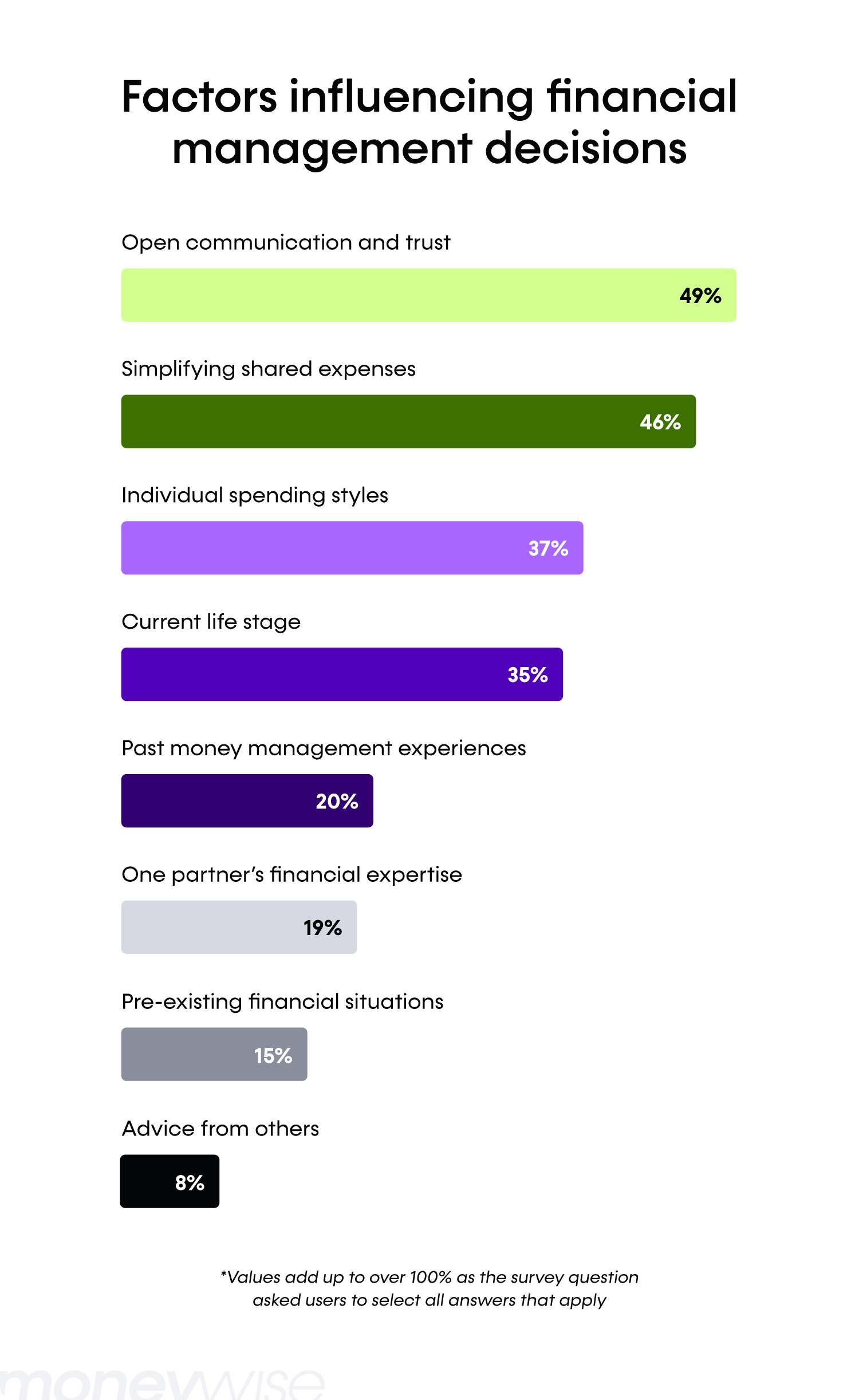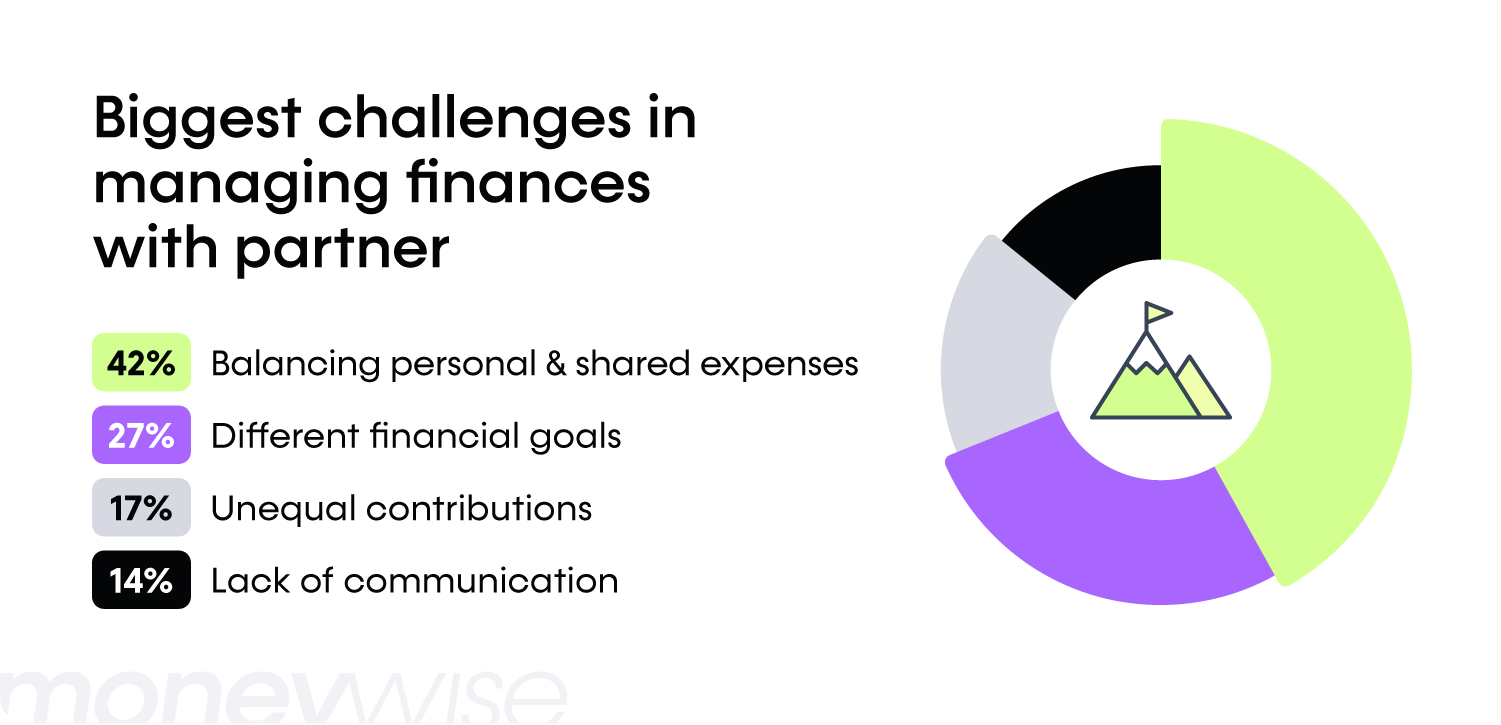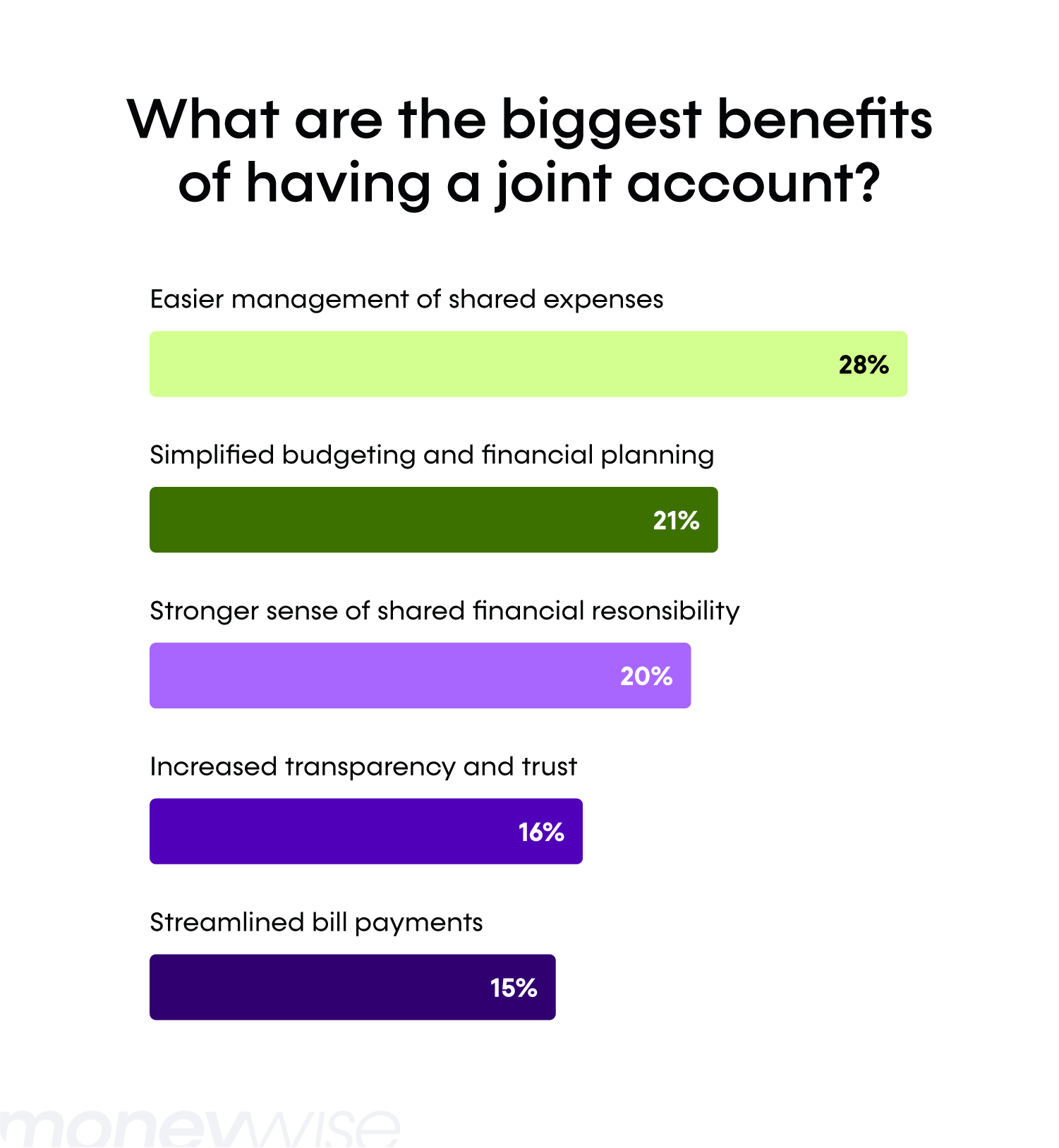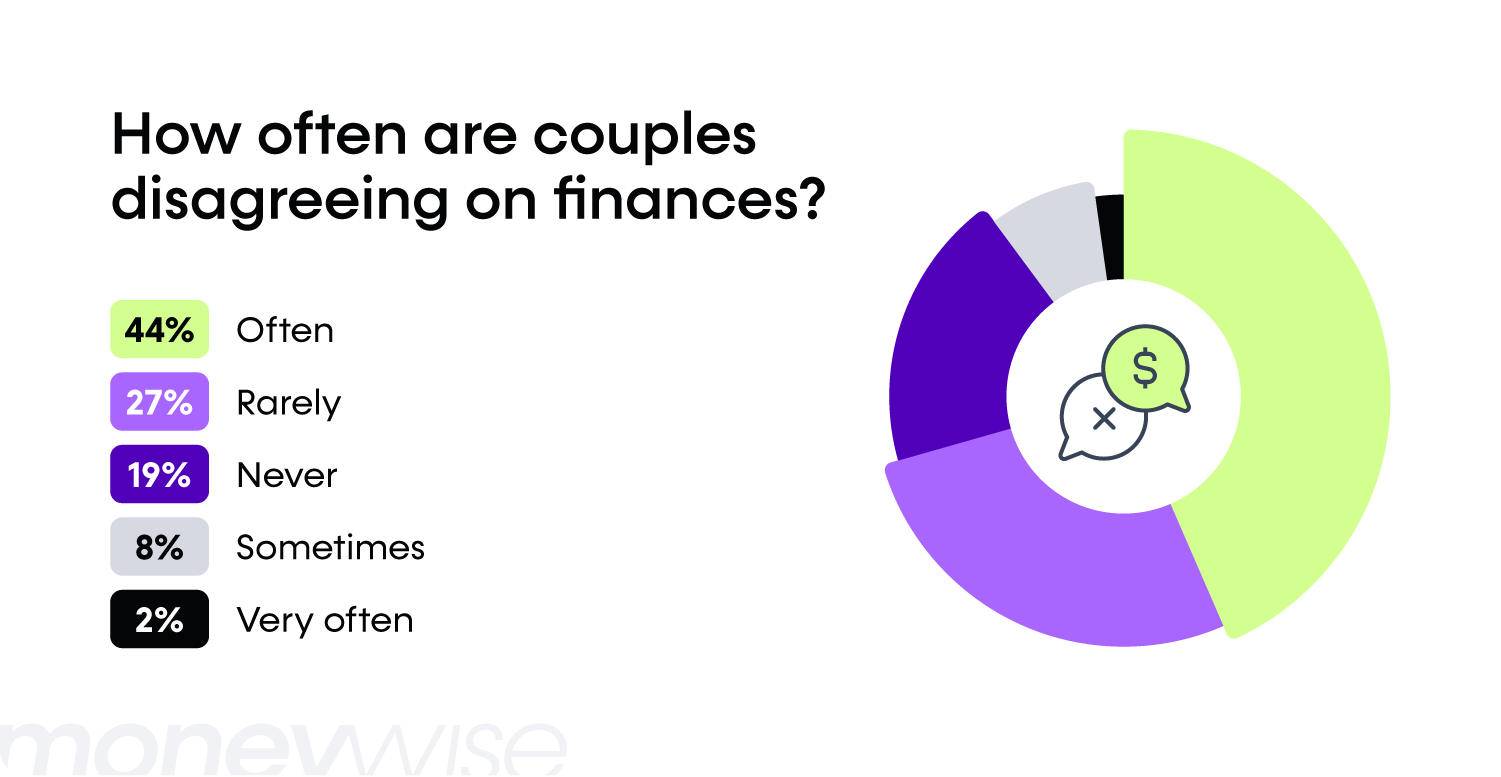Managing finances as a couple can be tricky.
Open communication and aligned financial strategies are crucial for a healthy relationship, and money disagreements can be a major stressor.
In fact, financial conflicts are so significant that according to National Debt Relief1, 54% of people see a partner's debt as grounds for divorce.
To understand how couples navigate shared finances, we surveyed 555 people in relationships, exploring couple investments, budgets and comfort in discussing money. Our findings reveal key insights into how modern couples approach financial partnership and the challenges they face in building a stable financial future together.
Key takeaways
- Nearly one-half of couples say financial transparency and open communication is key to success.
- 42% of couples struggle to balance personal spending with shared financial responsibilities.
- Nine out of 10 couples rarely or never experience major financial conflicts.
Financial transparency is key — but nearly one-half of couples keep money secrets
Open communication and trust are crucial in joint finances, and 49% of survey respondents highlighted the importance of these factors, underscoring the emotional connection and need for transparency in financial partnerships.
However, this emphasis on communication contrasts with a recent Bankrate study, which found that 40% of US adults in committed relationships admit to some form of financial infidelity2, with 33% confessing to secretly spending more than their partner would approve of.
This raises an important question: While couples value transparency, does it always include honesty? The prevalence of financial infidelity suggests it often doesn't.
Left unchecked, these financial secrets can impact trust, strain relationships and even lead to long-term financial instability. Setting clear boundaries and establishing open conversations about money can help couples strengthen both their financial and emotional partnership.

42% of couples struggle to balance personal and shared finances
Managing finances with a partner can be a tricky balancing act. When asked about the biggest challenges, 42% of respondents cited difficulty balancing personal spending with shared financial responsibilities.
This suggests that couples who don’t see eye to eye on money may find it challenging to balance personal spending with shared financial commitments, such as mortgage payments or savings goals.
The second most common response, at 27%, was having different financial goals or priorities. This underscores the need for effective budgeting strategies that seamlessly manage personal and shared finances. These tools could foster communication, create clear spending plans and align individual and joint goals for a more harmonious partnership.

Nearly 1 in 3 Americans choose joint bank accounts for simplified money management
For smart financial couples, joint bank accounts offer a practical solution for managing shared expenses (27.75%). This focus on practical, day-to-day financial management outweighs emotional or relationship-focused benefits.
While simplified financial planning (21.44%) and shared responsibility (19.82%) are important considerations, the ability to tailor the account to specific needs — based on expenses, income and savings goals — is key.
Other benefits, such as increased transparency (15.86%) and streamlined bill payments (15.14%), are secondary. Ultimately, joint accounts empower these couples to take greater control of their combined finances.

Younger couples embrace financial independence, while seniors favor shared financial control
Gen Z takes a distinctly independent approach to finances, with nearly one-half (49%) of those aged 18-29 keeping their money completely separate — the highest percentage of any generation. This contrasts sharply with baby boomers, where only 27% keep their finances separate, while a clear majority (65%) prefer joint accounts.
Some say joint accounts make marriages stronger, which may explain why older couples favor shared financial control. This generational shift suggests younger couples increasingly prioritize financial independence.
While the average age of first marriage (28.4 for women, 30.2 for men)3 might contribute, other factors are likely at play. Unlike older generations — where women couldn’t open their bank accounts without a male co-signer until 1974 — many younger adults have managed their own finances from the start.
Student loan debt has seen the fastest growth among Gen Z borrowers (6.72% compound annual rate)4. Therefore, economic uncertainty could be a significant influence in shaping how younger generations approach shared finances.

9 out of 10 couples successfully navigate money talks
Many couples face challenges when sharing money, but how often do these challenges lead to major conflicts? When asked about disagreements or differing opinions regarding finances and budgeting, the vast majority (89.91%) of couples reported rarely or never having financial conflicts. When they do, they manage them effectively. Of those, 43.42% experience only minor disagreements.
Only a small fraction (2.16%) view financial disagreements as a major source of conflict. This largely positive response suggests that while financial discussions are common, they rarely escalate into issues that seriously impact relationships.
Couples who frequently disagree (7.93%) or face major conflicts may benefit from financial communication tools or counseling to navigate these challenges.

Take control of your shared finances with Moneywise
Sharing finances as a couple can be complex, but with the right information, you can make smarter decisions together. Moneywise.com provides the insights, tips and tools to help you navigate budgeting and long-term planning.
Start exploring Moneywise today to gain the knowledge you need to manage your finances effectively.
Methodology
The survey was conducted by SurveyMonkey Audience for Moneywise.com. The survey was fielded on February 13, 2025. The results are based on 555 completed surveys. In order to qualify, respondents were screened to be residents of the United States, over 18 years of age and in a relationship. Data is unweighted, and the margin of error is approximately +/-2% for the overall sample with a 95% confidence level.

The Moneywise Editorial Team is a group of passionate financial experts, seasoned journalists, and content creators who are deeply committed to providing unbiased, relevant, and accurate financial information. With years of combined industry experience, our team is dedicated to maintaining the highest journalistic standards and delivering informative and engaging content. From personal finance and investing to retirement planning and business finance, we cover a broad range of topics to suit the financial needs of our diverse readership. You can trust the Moneywise Editorial Team to empower you with the knowledge and tools necessary to make wise financial decisions.
Explore the latest articles

How a lack of emergency savings hurts retirees
When it comes to retirement, an ounce of prevention is worth a pound of cure.
Disclaimer
The content provided on Moneywise is information to help users become financially literate. It is neither tax nor legal advice, is not intended to be relied upon as a forecast, research or investment advice, and is not a recommendation, offer or solicitation to buy or sell any securities or to adopt any investment strategy. Tax, investment and all other decisions should be made, as appropriate, only with guidance from a qualified professional. We make no representation or warranty of any kind, either express or implied, with respect to the data provided, the timeliness thereof, the results to be obtained by the use thereof or any other matter. Advertisers are not responsible for the content of this site, including any editorials or reviews that may appear on this site. For complete and current information on any advertiser product, please visit their website.
†Terms and Conditions apply.